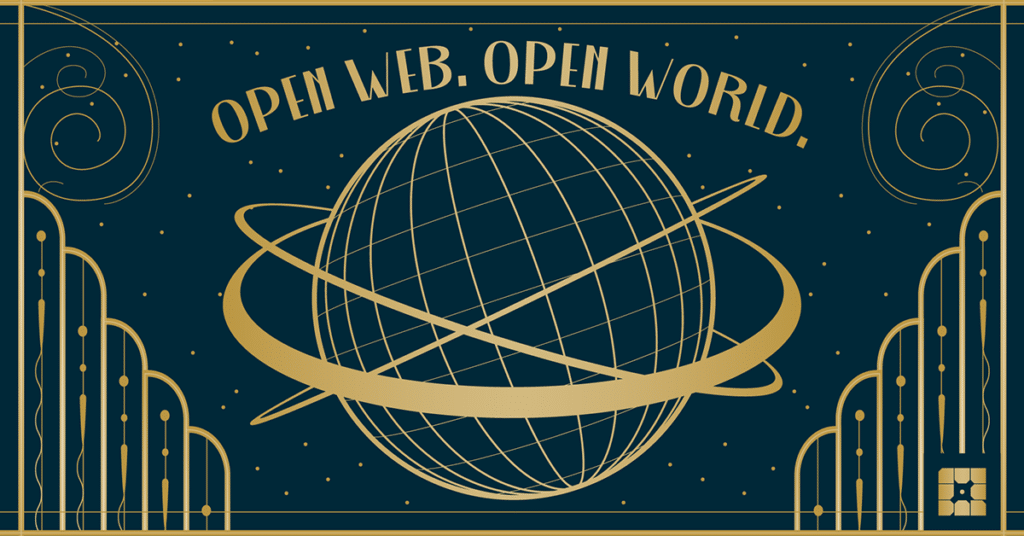
Open Web. Open World. All Hands 2022
WP Engine All Hands 2022 wrapped up last week, marking the 10th anniversary of our company-wide event for employees.
All Hands has been a part of our DNA since 2012, when all WP Engine employees (around 30 people at the time) congregated at the Capital Factory in downtown Austin, TX, for a day of discussions about WordPress, building better websites, and creating a better hosting company for WordPress users.
Fast forward to 2022, and we’ve certainly grown, but the focus from our first All Hands has remained in place, guiding us to become the WP Engine we are today—a global technology company with more than 1,300 employees and 185,00 customers in over 150 countries.
Through it all, All Hands has been our center point, the opportunity to reconnect, re-enthuse, and refresh our collective vision around all the powerful work we’ve accomplished and all of the great things yet to come.
Read on for a recap of this year’s All Hands, including keynote speeches from WP Engine’s leadership to important content surrounding our products, the people who make them, and the way they’re impacting the future of WordPress!
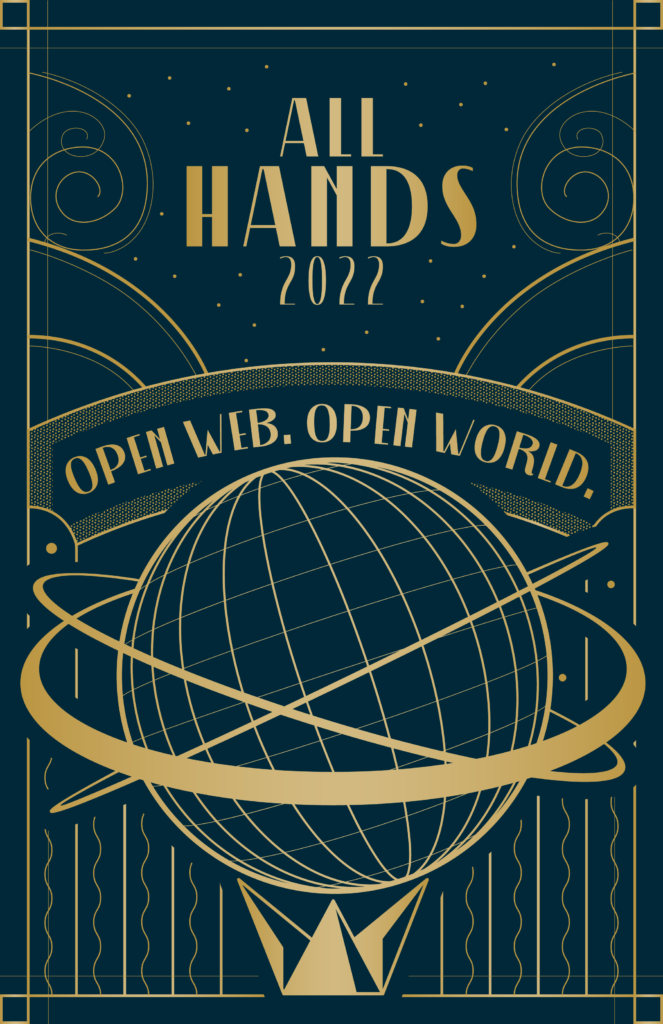
Keynote: Open Web, Open World
This year’s All Hands theme was Open Web, Open World, with content focused on the benefits of open source development through WordPress and the importance of contributing to an internet that’s fast, secure, and open for all.
In their joint keynote presentation, WP Engine Chairwoman and CEO Heather Brunner and Founder and CTO Jason Cohen discussed the importance of open source technologies in a free and open world and WP Engine’s role in supporting an open web.
“We believe a free and open web allows for the freedom of ideas, discourse, and discovery that enables a free and open world,” Brunner said as she opened the keynote session.
“We believe that designers and developers of the modern web are the most essential creatives of our time, and we believe that the brilliant minds building digital experiences on WordPress should be free to spend their precious time innovating for our collective future.”
Expanding on that theme, Cohen provided a historical overview of software development, noting that most early software was open and that the introduction of closed software had limited both innovation and community.
“It makes sense that companies need to make money, but [closed software] is worse for the craft of software because there’s no community that can grow up around it,” Cohen said.
On the other hand, open source projects provide developers with the ability to create a better, more dynamic online ecosystem because they can learn from one another and thrive in the community environment that surrounds them.
WordPress, Cohen added, is a prime example of that open source success.
“WordPress is open in every way you can define ‘open,’” he said. “The more people use WordPress, the more open the web is. When we say 43% of the web is WordPress, we’re also saying 43% of the web is open in all of these important ways.”
Closing the session, Brunner also highlighted the astounding timeline of WP Engine’s growth and shared a broader vision of our mission.
As stewards of open source technology, WP Engine will double down on efforts to increase our relationships with developers, agencies, and all who stand to benefit from an open source future.
Guest Keynote: Alexis Hancock
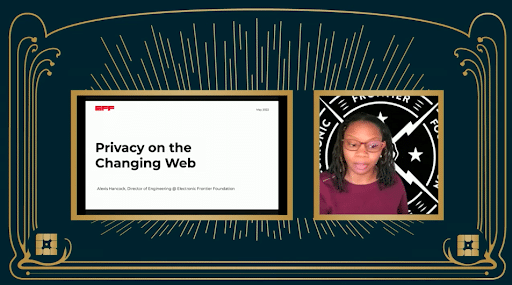
Our guest keynote speaker for this year’s All Hands was Director of Engineering at the Electronic Frontier Foundation (EFF) Alexis Hancock. The EFF is the leading nonprofit digital rights group defending digital privacy, free speech, and innovation. With more than 10 years of experience in application development and security, Hancock has spoken to tech companies, innovators, and government bodies across the globe about the vital work the EFF undertakes every day.
Hancock’s session focused on the work the EFF has done and is doing surrounding internet privacy and security in an ever-changing digital landscape.
“We must craft better laws around privacy,” Hancock said. “We only really started with GDPR and CCPA, and they’re not perfect. We see the consequences of “not perfect” by framing things around user consent, so now it’s on the burden of the user to give consent to track each time, instead of something like DNT, which would have been a one-and-done signal from a website and require no user interaction.”
The work lies at the intersection of technology, policy, and activism, and whether they’re defending against the dangers of the Splinternet or investigating concerns around data portability, Hancock and the EFF are at the forefront of conversations surrounding digital privacy.
Breakout sessions
Getting Your Head around Headless
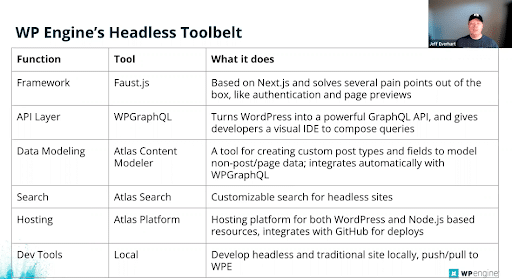
Headless technology is taking over the enterprise space, leaving many to scratch their heads and wonder, “what is a headless website?” In this breakout session, WP Engine Sr. Developer Advocate Jeff Everhart broke it down in simple terms to provide a better understanding of what headless websites are and why they’re gaining popularity, especially for large-scale sites.
In essence, headless websites refer to those with a decoupled architecture, which allows the front-end display to be managed separately and use different tools than those found in the back end. Because websites often have multiple users with different roles and preferences making updates to different sections of the site, this allows teams to rely on the tools they love best. For example, a marketing team making content changes on the back end of a site (i.e., WordPress) would be able to use different tools than a developer working on the front end (JavaScript) —and neither team’s work will interfere with the other’s.
Beyond using different tools and frameworks, headless sites also offer faster load times, increased security, and allow users to write content once and push it live to multiple ends—or heads—like websites, iOS, or the Internet of Things (IoT).
“Building a site is like building a house,” said Everhart. “There are plenty of tools to choose from that will get the job done, and while one type of hammer may not be better than another, builders have preferences for when they use what type of tool.”
Everhart also demonstrated the ease of building a headless site with Headless WordPress, WP Engine’s headless WordPress platform, and shared how WP Engine is leading the way for headless WordPress development. In fact, he built the demo site using Headless WordPress BluePrints in under ten minutes!
The Future of WordPress: A Report from the Bleeding Edge
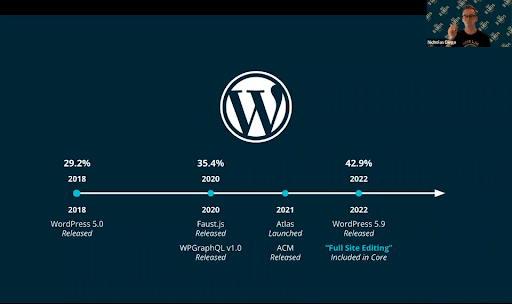
In this breakout session, Developer Advocate Nick Diego shared a quick timeline of the history of WordPress, including WP Engine’s impact on it and how our company is shaping the future of the community.
It’s hard to believe that WordPress is only 19 years old, with version 0.7 being released in 2003 (version 0.6 was still called b2/cafelog). Other notable events along the WordPress timeline included the founding of WP Engine (2010), the introduction of the REST API into Core (2016), the release of Gutenberg (2018), and the introduction of WPGraphQL (2020).
With the release of WordPress version 5.9, which introduced the community to Full Site Editing (2022), WordPress was fundamentally changed. Full Site Editing refers to features that bring the block-building experience to all parts of a website, allowing for no-code and low-code building on WordPress.
“I’m calling it. The visual editing revolution is here,” Diego said. “People want to edit their websites visually, without the need for code, and they now have that option with WordPress.”
The no-code/low-code future is huge for freelance designers and agencies, as they’ll have an increased ability to design beautiful, functional sites with less technical experience. And while Diego said low-code and no-code building is the future, he also emphasized that this shouldn’t be a fear for builders.
Technical developers can adapt their skills to find ample opportunities in headless development, custom block development, editor extensions, and more. These individuals will also be vital in creating the new tools and educational resources to make learning modern WordPress development easier.
As a leader in WordPress, WP Engine is already embracing the future of WordPress. We’re building tools like Headless WordPress Content Modeler and Frost that will bring innovations for headless sites and Full Site Editing themes. We’re hosting meetups and conferences to help educate developers, both the seasoned builders adapting to this new normal and the fresh faces that are just starting out. And, of course, our teams will continue contributing to Core as we all create the future of WordPress together.
Opening up a World (Wide Web) of Possibilities
The future of WordPress is bright, and WP Engine remains committed to leading the way in the open source future. If you’re interested in helping WP Engine create a better, more secure, and more open internet, consider a career at WP Engine!
Whether you work near an office hub location or you’re interested in a fully remote position, we offer ample opportunities to grow, thrive, and bring your full self to work every day.
Start the conversation.